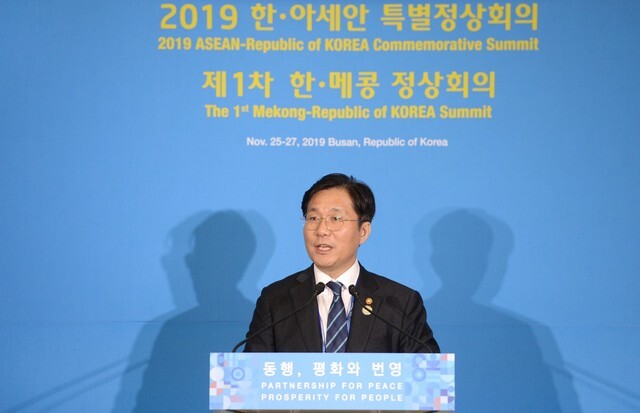hankyoreh
Links to other country sites 다른 나라 사이트 링크
S. Korea-Japan negotiations on export controls may begin as early as this week

Low-level trade officials from South Korea and Japan will be initiating technical talks as early as this week with the goal of rolling back Japanese export controls on Korea. But the sharp back-and-forth between the two countries since South Korea suspended plans to terminate their General Security of Military Information Agreement (GSOMIA) might have an impact on the trade deliberations.
“In keeping with our Nov. 22 decision to hold deliberations about bilateral export management, section chiefs from our two countries will be beginning working-level talks as soon as this week,” an official from the Ministry of Trade, Industry, and Energy told the Hankyoreh during a telephone interview on Nov. 25.
The section chiefs’ talks will be held to coordinate the agenda and schedule of upcoming director-general level deliberations between bureau chiefs. If there aren’t any hitches in the working-level talks, bureau chiefs from the two countries will meet before the middle of December to launch a discussion about relaxing and eventually abolishing the export controls. The South Korean representative to these talks is likely to be Lee Ho-hyeon, director-general for international trade policy at the Ministry of Trade, Industry, and Energy (MOTIE).
The primary item on the agenda of the director-generals’ deliberations will probably be easing controls on the exports of three key materials used in manufacturing semiconductors, controls that Japan imposed back in July.
“While an all-inclusive deal is conceivable, a step-by-step approach will probably be taken in the negotiations. In terms of urgency and importance, the three materials will probably be prioritized in the discussion. [South Korea’s removal from] the white list will probably be discussed at a later point, since reversing that decision requires enacting an enforcement decree, which would take some time,” a MOTIE official said.
But since the South Korean and Japanese governments have offered conflicting interpretations of Seoul’s retraction of its complaint with the World Trade Organization (WTO) and its postponement of the termination of GSOMIA, it’s also possible that the trade talks will be delayed.
Shortly after South Korea and Japan announced that they’d reached an agreement on Nov. 22, the Japanese press reported that Japan’s Ministry of Economy, Trade, and Industry had said that it “hadn’t changed its policy of individually reviewing requests for export permits of the three materials.” Chung Eui-yong, director of the Blue House’s National Security Office, objected to those reports by declaring that they “contradicted what had been agreed in advance.”
On the evening of Nov. 24, Japan’s Ministry of Economy, Trade, and Industry (METI) posted on its official Twitter account that it had “announced that it was resuming talks with South Korea about export management policy and its future plans for handling the three materials that are reviewed on an individual basis on 6:07 pm, Nov. 22, shortly after exchanging opinions with South Korea through diplomatic channels.”
“We cleared the main points of those plans in advance with the South Korean government,” METI said in its tweet.
South Korean Minister of Trade, Industry, and Energy Sung Yun-mo commented about the bilateral trade regulation talks during a briefing on Nov. 25 at the Busan Exhibition and Convention Center (BEXCO), which is hosting the South Korea-ASEAN summit. “Our two countries have reached an agreement to hold deliberations about export controls. We will do our best to reach an agreement through working-level talks to quickly decide the exact timing, location, and agenda of those deliberations,” Sung said.
By Kim Eun-hyoung and Lee Wan, staff reporters
Please direct comments or questions to [english@hani.co.kr]

Editorial・opinion
![[Editorial] Silence won’t save Yoon [Editorial] Silence won’t save Yoon](https://flexible.img.hani.co.kr/flexible/normal/500/300/imgdb/original/2024/0701/681719819632087.jpg) [Editorial] Silence won’t save Yoon
[Editorial] Silence won’t save Yoon![[Column] The miscalculations that started the Korean War mustn’t be repeated [Column] The miscalculations that started the Korean War mustn’t be repeated](https://flexible.img.hani.co.kr/flexible/normal/500/300/imgdb/original/2024/0630/9717197068967684.jpg) [Column] The miscalculations that started the Korean War mustn’t be repeated
[Column] The miscalculations that started the Korean War mustn’t be repeated- [Correspondent’s column] China-Europe relations tested once more by EV war
- [Correspondent’s column] Who really created the new ‘axis of evil’?
- [Editorial] Exploiting foreign domestic workers won’t solve Korea’s birth rate problem
- [Column] Kim and Putin’s new world order
- [Editorial] Workplace hazards can be prevented — why weren’t they this time?
- [Editorial] Seoul failed to use diplomacy with Moscow — now it’s resorting to threats
- [Column] Balloons, drones, wiretapping… Yongsan’s got it all!
- [Editorial] It’s time for us all to rethink our approach to North Korea
Most viewed articles
- 1[Editorial] Silence won’t save Yoon
- 2Yoon’s prosecutors are throwing everything at the president’s opponents to see what’ll stick
- 3Japan is building a military meant for more than self-defense — and has the US to thank for it
- 4[Column] The miscalculations that started the Korean War mustn’t be repeated
- 5NewJeans rocks Tokyo Dome as new, younger generation of K-pop fans emerges in Japan
- 6Dreams of a better life brought them to Korea — then a tragic fire tore them apart
- 7What made Korea’s lithium battery plant fire so deadly
- 8[Editorial] Exploiting foreign domestic workers won’t solve Korea’s birth rate problem
- 9Dispatched into unknown danger, foreign day laborers were defenseless against blaze
- 10Moscow tells Seoul to rethink ‘confrontational course’